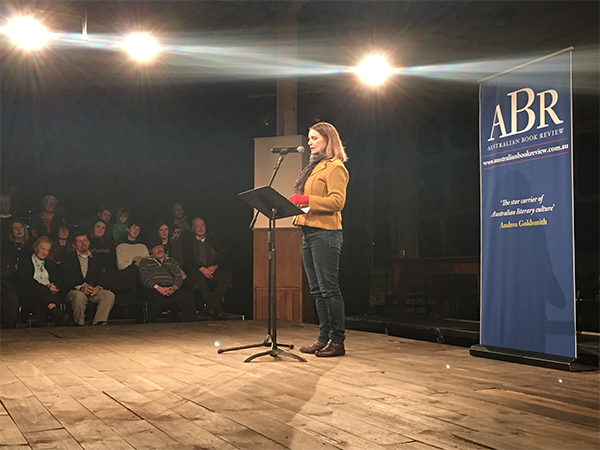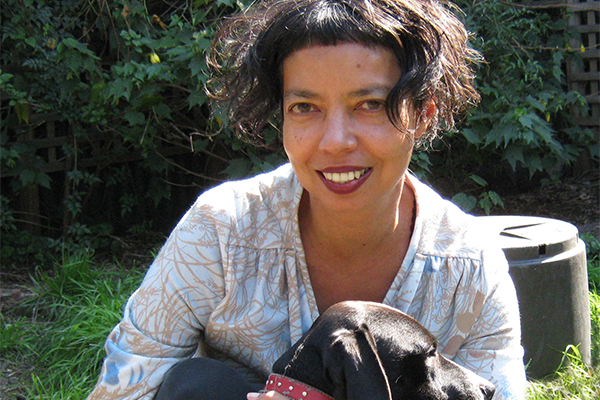News from the Editor's Desk - August 2018
Jolley Prize
Despite afoul August weather, a large audience filled fortyfivedownstairs in Melbourne on August 20 for the annual ABR Elizabeth Jolley Short Story Prize ceremony. Novelist Patrick Allington – chair of the judging panel – spoke after the readings from our three shortlisted authors, and commented that the Jolley entries showed that ‘short story writers are busy responding to these challenging political times – whether it’s at the local level (where “local” is for an individual writer), the national level (however interpreted), or the global level.’
Madeleine Lucas was named the overall winner for her story ‘Ruins’. She received $7,000. The judges commented: ‘Sensual, tactile and full of quiet fire, “Ruins” is a story bold and assured enough to take the questions that lurk in literature’s heart – questions of love, desire and choice – and ask them outright. As a mother and her newly adult daughter drive out to a ruined lighthouse, they slip back into old roles, but carry new secrets. Richly anchored in place, and alive to Australian history, this story speaks strongly to how women learn to inhabit themselves and the world. Timely and gorgeously evocative.’
 Claire Aman, who received third place in the Jolley Prize, reading her story 'Vasco'.
Claire Aman, who received third place in the Jolley Prize, reading her story 'Vasco'.
Madelaine Lucas, who received $7,000, commented: ‘I am overjoyed to win this year’s ABR Elizabeth Jolley Short Story Prize. My very first publication came from a magazine contest, so I know firsthand the opportunities they provide to new writers. I am incredibly grateful to the ABR and judges for choosing my story and helping me to connect with Australian readers.’
Sharmini Aphrodite (Singapore) – at twenty-two the youngest person yet shortlisted for the Jolley Prize – receives $2,000 for her story ‘Between the Mountain and the Sea’, which the judges described as ‘bibliophilic, notational, fragmentary, lush and quivering in its density. There is an archival and luminous texture to the story as it bleeds into the torn edges of culture, class and history, the narrator hovering, like a witness in the transient foreground, where the gaps coalesce.’
Claire Aman (NSW), placed third, receives $1,000 for ‘Vasco’, of which the judges said: ‘a mapmaking narrator commemorates a deep bond with her now-departed neighbour. In achingly poetic and at times claustrophobic prose, the narrator looks within herself to offer a rich but exposing portrait of a contained world view.’
All three shortlisted stories appear in the August Fiction issue, which can be purchased online.
Calibre Essay Prize
 J.M. Coetzee is a judge of the 2019 Calibre Essay Prize (Photo by Bert Nienhaus)For the thirteenth time, we seek entries in the Calibre Essay Prize – the country’s premier prize for an unpublished non-fiction essay. The Prize is worth a total of $7,500, of which the winner receives $5,000 and the runner-up $2,500. Both essays will appear in ABR. Once again, Calibre is open to anyone writing in English around the world. The judges on this occasion are J.M. Coetzee, Anna Funder, and Peter Rose.
J.M. Coetzee is a judge of the 2019 Calibre Essay Prize (Photo by Bert Nienhaus)For the thirteenth time, we seek entries in the Calibre Essay Prize – the country’s premier prize for an unpublished non-fiction essay. The Prize is worth a total of $7,500, of which the winner receives $5,000 and the runner-up $2,500. Both essays will appear in ABR. Once again, Calibre is open to anyone writing in English around the world. The judges on this occasion are J.M. Coetzee, Anna Funder, and Peter Rose.
Reflecting the plastic nature of the form, we welcome all kinds of essays – from the literary and the political to the experimental and highly personal.
Guidelines and the entry form are available on our website. Entries will close on 14 January 2019. The two winners will be named in our April 2019 issue.
All previous Calibre-winning essays are available online.
We thank Colin Golvan AM QC (Chair of ABR) and the ABR Patrons for enabling us to present Calibre in this lucrative form.
Michelle de Kretser wins Miles Franklin Award
 Michelle de Kretser (Photo via Allen & Unwin)
Michelle de Kretser (Photo via Allen & Unwin)
Congratulations to Michelle de Kretser for winning the Miles Franklin Literary Award this year for her novel The Life To Come. It is the second time Australia’s most prestigious literary prize has been awarded to de Kretser, making her the third woman to win the $60,000 award more than once after Thea Astley and Jessica Anderson. ABR attended the announcement ceremony at Deakin Edge on Sunday, and witnessed Michelle speak powerfully about Australia’s treatment of asylum speakers while accepted her award, just as she did in her excoriating speech in 2013 when she received the Prime Minister’s Literary Award for Questions of Travel (which also won the Miles).
Michelle made a point of naming those who have died on Manus Island and Nauru – those who are officially reduced to an identification number. Beejay Silcox, reviewing ‘The Life to Come’ for ABR in October 2017, wrote: ‘De Kretser’s vision of Australia will be easy to recognise, but hard to own. She presses on points of national tenderness, and they smart. Here is a country suspicious and resentful of its own success, and prone to delusions of victimhood.’
Speaking of her win, de Kretser said, ‘I feel twice as lucky, twice as happy, and twice as honoured.’ The Life To Come was selected from a formidable shortlist, including: Felicity Castagna’s No More Boats, Eva Hornung’s The Last Garden, Catherine McKinnon’s Storyland, Gerald Murnane’s Border Districts and Kim Scott’s Taboo. Chair of the 2018 judging panel, Richard Neville, said of the The Life to Come: ‘Sentence-by-sentence, it is elegant, full of life and funny. With her characteristic wit and style, Michelle de Kretser dissects the way Australians see ourselves, and reflects on the ways other parts of the world see us.’
PEN in WA
A group of prominent Perth writers have formed a Perth Centre of PEN International, to work with existing centres in Sydney and Melbourne. PEN works for responsible freedom of expression. Perth PEN is based at the Centre for Stories in Northbridge and has an active program of events, including a reading of works by imprisoned writers on August 23 and a panel in partnership with AmnestyWA in October.
Details of events and membership are available at www.perthpen.org
Book of the Week
Book of the Week – our new online feature – appears each Monday: a review of a major new publication. This feature can be read freely for one week, and will then appear in the following print edition.
Mao’s Last Dancer Li Cunxin brings A Midsummer Night's Dream to Melbourne
 A promotional image of Queensland Ballet's A Midsummer Night's Dream (photo by Queensland Ballet)
A promotional image of Queensland Ballet's A Midsummer Night's Dream (photo by Queensland Ballet)
Chinese-Australian ballet star Li Cunxin, known internationally from his bestselling memoir Mao’s Last Dancer, is bringing the Queensland Ballet production of A Midsummer Night’s Dream to Melbourne this October. Li Cunxin, now a world-famous ballet dancer, has been Queensland Ballet's Artistic Director since July 2012. ‘We’re very proud to present this co-production,’ said Li Cunxin. ‘I’m thrilled to bring Queensland Ballet back to what was my first home in Australia.’
The production will be choreographed by Liam Scarlett, who is also producing a new production of Swan Lake for The Royal Ballet – having been appointed their first Artist’s Residence in 2012. Following Melbourne, Queensland Ballet will then take it’s show to Shanghai, Beijing, Xi’an and Suzhou. It will be a momentous return to his roots for Cunxin, who began his career in ballet at the young age of eleven when selected by Madame Mao’s cultural advisors to attend the Beijing Dance Academy.
For more information, visit the Queensland Ballet website.
Reader survey
We thank all those who completed our online reader survey – almost 500 readers in all. We were heartened by the overall tenor of your comments on the magazine, but we also noted your suggestions and criticisms. These will help us to continue reshaping the magazine.
We’re always curious to find out what people think about our coverage of Australian books vis-à-vis those published overseas. Seventeen per cent of respondents favoured more overseas titles; sixteen per cent favoured fewer – sixty-seven per cent preferred the status quo. (These percentages have hardly changed since our first reader survey back in 2006.)
As always, we invited readers to nominate their favourite book reviewers and arts critics. Names that came up again and again were Geordie Williamson, Morag Fraser, Robert Dessaix, and Brenda Niall – but the clear favourite, on this occasion, was Beejay Silcox, the ABR Fortieth Birthday Fellow, who has made such an impression in the magazine (and elsewhere) since she began contributing in 2016.







Leave a comment
If you are an ABR subscriber, you will need to sign in to post a comment.
If you have forgotten your sign in details, or if you receive an error message when trying to submit your comment, please email your comment (and the name of the article to which it relates) to ABR Comments. We will review your comment and, subject to approval, we will post it under your name.
Please note that all comments must be approved by ABR and comply with our Terms & Conditions.